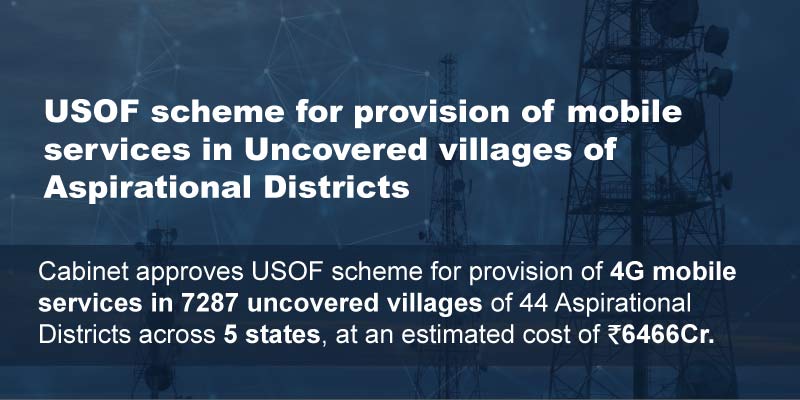- India
- Nov 18
Cabinet approves USOF scheme for mobile services in 7,287 villages
• The Union Cabinet cleared utilisation of the Universal Service Obligation Fund (USOF) for provision of mobile connectivity in 7,287 uncovered villages across five states at an estimated cost of Rs 6,466 crore.
• These uncovered villages in 44 aspirational districts across five states of Andhra Pradesh, Chhattisgarh, Jharkhand, Maharashtra and Odisha will get 4G-based mobile services.
• The project would be funded by the USOF, and would be completed within 18 months of signing of the agreement.
• The work related to provision of 4G mobile services in identified uncovered villages would be awarded through an open competitive bidding process as per extant USOF procedures.
• The present proposal for provisioning of mobile services in the remote and difficult uncovered areas of aspirational districts across five states will enhance digital connectivity useful for self-reliance, facilitate learning, dissemination of information and knowledge, skill upgradation and development, disaster management, e-Governance initiatives.
• The move would also enable establishment of enterprises and e-commerce facilities, provision of adequate support to educational institutes for knowledge sharing and availability of job opportunity, while fulfilling the vision of Digital India.
What is Universal Service Obligation Fund (USOF)?
• Universal Service Obligation Fund (USOF), formed by an Act of Parliament, was established in April 2002 under the Indian Telegraph (Amendment) Act 2003 (further amended in 2006), to provide financial support for the provision of telecom services in commercially unviable rural and remote areas of the country.
• It is an attached office of the Department of Telecom, and is headed by the administrator, who is appointed by the central government.
• The resources for implementation of USO are raised by way of collecting a Universal Service Levy (USL), which is 5 per cent of the Adjusted Gross Revenue (AGR) of Telecom Service Providers.
• Universal Access Levy amounting to Rs 1,12,029 crore has been collected and the total allotment amounting to Rs 56,328.45 crore received through Parliamentary approvals has been utilised to fulfil the objective of USO Fund.
• It is a non-lapsable Fund. Levy amount is credited to the Consolidated Fund of India. Fund is made available to USOF after due appropriation by the Parliament.
• Initially, the USO Fund was established with the fundamental objective of providing access to ‘basic’ telecom services to people in the rural and remote areas at affordable and reasonable prices.
• Subsequently, the scope was widened to provide subsidy support for enabling access to all types of telecom services, including mobile services, broadband connectivity and creation of infrastructure like OFC in rural and remote areas.
Additional read:
The concept of universal service
In 1837, the concept was pitched by Rowland Hill with his postal reforms, a British educator and tax reformer, which included uniform rates across the United Kingdom and prepayment by sender via postage stamps. In the modern world, universal service refers to having a phone and affordable phone service in every home. It means, providing telecommunication service with access to a defined minimum service of specified quality to all users everywhere at an affordable price.
Manorama Yearbook app is now available on Google Play Store and iOS App Store

